Dickensians! discussion

This topic is about
Out of the Season and Out of Town
Dickens Travelogues
>
Out of the Season and Out of Town (hosted by Kathleen)

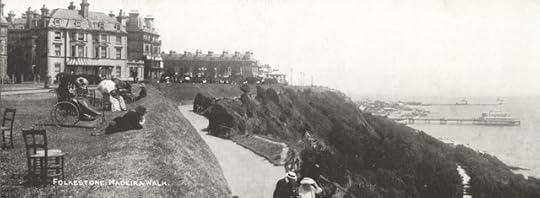
(Photo courtesy of https://www.folkestonehistory.org/)
Let’s escape the dog days of summer and head to the sea! One of Charles Dickens’ haunts was Broadstairs, as we know, but if you go south from there around the coast of Kent, you will hit Deal and Folkestone, the likely inspirations for these two essays, Out of the Season and Out of Town.
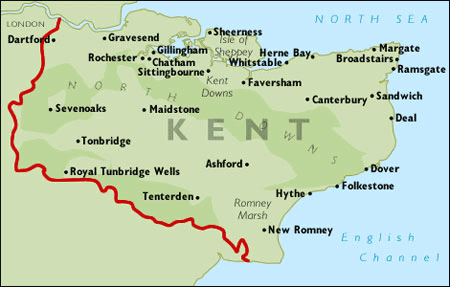
You can read them on Project Gutenberg here: https://www.gutenberg.org/files/872/8..., where Out of Town comes first, so we'll discuss it first.
What I expected from these pieces was something of a travelogue, but silly me. This is Dickens. He can’t just remark on the beautiful seaside, the flora and the fauna. No. He uses the places to launch his imagination, and it takes him on journeys that expand his view to so much more.
I’ll post an intro and schedule soon, and we’ll begin on Tuesday the 15th!
 Introduction
IntroductionI have seen a few different publication dates for these two essays, but according to Wikipedia’s Dickens bigliography, the year was 1855, which would put it after Hard Times (1854) and while he was working on Little Dorrit (1855-1857). He rented a house that year in Folkestone to work on Little Dorrit, and someone has made very short video of it posted here: https://www.youtube.com/watch?v=lOZ7e....
In "Out of Town," Dickens is in the perfect place to observe a lovely seaside town.
“We are sensibly laid out in general; and with a little care and pains (by no means wanting, so far), shall become a very pretty place. We ought to be, for our situation is delightful, our air is delicious, and our breezy hills and downs, carpeted with wild thyme, and decorated with millions of wild flowers, are, on the faith of a pedestrian, perfect."
And in "Out of the Season," he attempts to take advantage of arriving in the off-season to do a little writing. But,
“It is a remarkable quality in a watering-place out of the season, that everything in it, will and must be looked at.”
And look he does!
I did a lot of googling while reading these, something probably unnecessary if I knew more about Dickens’ life, Britain, and history generally. It turned out to provide a bunch of fun discoveries for me, and I hope others will find these a fun read too. But my research was superficial at best, so PLEASE, ye knowledgeable Dickensians, correct anything I get wrong in my comments and add your understanding of the terms, places and events we’ll be exploring. Any thoughts you have are welcome of course, and it would also be fun to hear about personal experiences readers may have had of these places!
 Schedule
ScheduleI’ve divided each essay into four parts. Rather than a summary, I’ll point out a few highlights, including bits of geographical and historical information I’ve found, and maybe throw out a few questions I’m curious about. Then I’ll open it to what others might have found interesting in the section.
I have to be offline 8/18 and 8/19, so won’t post on those days, and I gave us a few more days off in between. Please post comments whenever you wish though, trying to stay within the schedule of the read as much as possible.
8/15 - Dickens and Travel Writing
8/16 - Out of Town part 1 through “the South-Eastern Railway Company screech at us in the dead of night.”
8/17 - Out of Town part 2 through “and you can make out your own bill beforehand, as well as the book-keeper.”
8/18 - no post
8/19 - no post
8/20 - Out of Town part 3 through “when he is brought out of his den to stand on his head in the presence of the whole Collection.”
8/21 - Out of Town part 4 through the end.
8/22 - No post
8/23 - Out of the Season part 1 through "could not have told me more of the state of things aboard, than I knew."
8/24 - Out of the Season part 2 through "cry of distress from the sinking emigrant ship."
8/25 - No post
8/26 - Out of the Season part 3 through "when they were infinite delights to me!"
8/27 - Out of the Season part 4 through the end.
8/28 - Final thoughts
 Dickens and Travel Writing
Dickens and Travel WritingTravel writing can be a vague term, and can include many things, going back to The Odyssey, Herodotus’ Histories, Marco Polo, etc. Before Dickens’ time, true stories like James Cook’s diaries were popular, as well as fictional travelling, like Robinson Crusoe and Gulliver's Travels.
But Dickens is considered one of the first great travel writers. He did really get around, living for a year in Italy, several months in Switzerland, and maintaining residences in Paris and Boulogne. He traveled and performed in Europe, America and Canada. I would call him a seasoned traveler!
Before he put his mind to the task, travel writing was about describing the world to people who would likely never have the opportunity to see much of it. He took it a step further. He brought his readers on the journey with him, as he does with his fiction. And with his background in journalism, he explored beyond the tourist sites, and looked into the history and social aspects of places he visited.
Dickens most famous travel books were
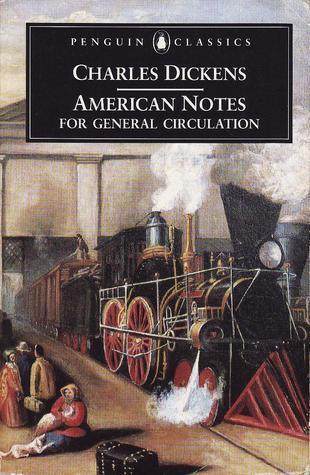
American Notes For General Circulation, and
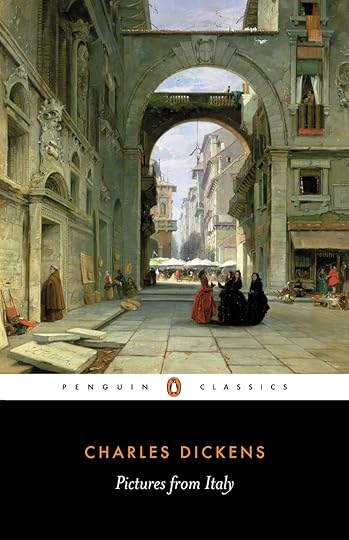
Pictures from Italy
Has anyone read these, or do you have other recommendations?
This is wonderful info, to start us off with! Thank you so much Kathleen 😊
And of course we had Pictures from Italy as our side read LINK HERE for the discussion - 58 of us in on that one!
And of course we had Pictures from Italy as our side read LINK HERE for the discussion - 58 of us in on that one!
 Bionic Jean wrote: "This is wonderful info, to start us off with! Thank you so much Kathleen 😊
Bionic Jean wrote: "This is wonderful info, to start us off with! Thank you so much Kathleen 😊And of course we had Pictures from Italy as our side read LINK HERE for the discussion - 58 of us in on that ..."
Thank you, Jean! And a great discussion of Pictures from Italy--I never thought to look. :-) I loved the pictures Milena shared. I think I would love this one.
 The video was a lovely way to set the stage for where we are, Kathleen. It will be lovely to travel with you and Charles!
The video was a lovely way to set the stage for where we are, Kathleen. It will be lovely to travel with you and Charles!
 Sara wrote: "The video was a lovely way to set the stage for where we are, Kathleen. It will be lovely to travel with you and Charles!"
Sara wrote: "The video was a lovely way to set the stage for where we are, Kathleen. It will be lovely to travel with you and Charles!"Thank you Sara, and I'm so glad you'll be along for the ride!
 I read that there are some books mentioned in David Copperfield that young David read as a child, so it is assumed Dickens read them too, whether as a child or later. Among them are some that could very well have sparked his interest in travel:
I read that there are some books mentioned in David Copperfield that young David read as a child, so it is assumed Dickens read them too, whether as a child or later. Among them are some that could very well have sparked his interest in travel:Don Quixote by Miguel de Cervantes Saavedra
Robinson Crusoe by Daniel Defoe
The Expedition of Humphrey Clinker by Tobias Smollett
The Vicar of Wakefield by Oliver Goldsmith
and probably many more!
Just reading these titles set me thinking. I've only read Don Quixote, and read that as an adult. What an impact all of these adventures would have on a young child--would certainly set them dreaming!
 Dickens' early reading surely influenced his writing and his life. I have read two of the four. I promise my Crusoe from time to time. I guess it will have to be a Bionic Jean side read before I get to it. 🙂
Dickens' early reading surely influenced his writing and his life. I have read two of the four. I promise my Crusoe from time to time. I guess it will have to be a Bionic Jean side read before I get to it. 🙂I also missed the Pictures From Italy read--actually started it and then had to abandon it for another time. You have already inspired me to get back to it soon, Kathleen.
Kathleen wrote: "I read that there are some books mentioned in David Copperfield that young David read as a child, so it is assumed Dickens read them too, whether as a child or later ..."
Yes, these are his favourite books which he "transferred" to David. We had a poll of them all a couple of years ago, to decide which to choose for our group Autumn read. The list is LINK HERE
As you can see, The History of Tom Jones, a Foundling by Henry Fielding won, so we read that one (look for the discussion thread if intersted). This Autumn we are reading another of them Tristram Shandy; and A Sentimental Journey by Laurence Sterne, beginning on 15th September!
It is lovely to think about the young Charles dreaming of travel and adventure, as you say, and what a globe-trotter he proved to be, for his time. 😊
Yes, these are his favourite books which he "transferred" to David. We had a poll of them all a couple of years ago, to decide which to choose for our group Autumn read. The list is LINK HERE
As you can see, The History of Tom Jones, a Foundling by Henry Fielding won, so we read that one (look for the discussion thread if intersted). This Autumn we are reading another of them Tristram Shandy; and A Sentimental Journey by Laurence Sterne, beginning on 15th September!
It is lovely to think about the young Charles dreaming of travel and adventure, as you say, and what a globe-trotter he proved to be, for his time. 😊
 I managed to get the pieces downloaded, read the posts and watched the video. I hope I can offer a little more than I contributed to the last. I especially enjoy works set on the ocean. I have spent many of my years living on or very near the ocean and I feel an affinity with the local characters even if they would have preceded me by 175 years. I am living the dog days of August since my cooling pump for my condo abandoned me with no chance of a replacement till sometime in September. So with inside temps ranging between 27° C and 30° C, do not be surprised if my comments melt down into gibberish every so often. I will try to post in the AM when its the coolest.
I managed to get the pieces downloaded, read the posts and watched the video. I hope I can offer a little more than I contributed to the last. I especially enjoy works set on the ocean. I have spent many of my years living on or very near the ocean and I feel an affinity with the local characters even if they would have preceded me by 175 years. I am living the dog days of August since my cooling pump for my condo abandoned me with no chance of a replacement till sometime in September. So with inside temps ranging between 27° C and 30° C, do not be surprised if my comments melt down into gibberish every so often. I will try to post in the AM when its the coolest.
 Sara wrote: "Dickens' early reading surely influenced his writing and his life. I have read two of the four. I promise my Crusoe from time to time. I guess it will have to be a Bionic Jean side read before I ge..."
Sara wrote: "Dickens' early reading surely influenced his writing and his life. I have read two of the four. I promise my Crusoe from time to time. I guess it will have to be a Bionic Jean side read before I ge..."And you've inspired me right back, because I also still have to read those two. Perhaps a buddy read someday?
 Bionic Jean wrote: "Kathleen wrote: "I read that there are some books mentioned in David Copperfield that young David read as a child, so it is assumed Dickens read them too, whether as a child or later ...."
Bionic Jean wrote: "Kathleen wrote: "I read that there are some books mentioned in David Copperfield that young David read as a child, so it is assumed Dickens read them too, whether as a child or later ...."Ooh, I'm tempted by Tristram Shandy, but the fall is a busy time. I'll keep an eye on the thread!
 Sam wrote: "I managed to get the pieces downloaded, read the posts and watched the video. I hope I can offer a little more than I contributed to the last. I especially enjoy works set on the ocean. I have spen..."
Sam wrote: "I managed to get the pieces downloaded, read the posts and watched the video. I hope I can offer a little more than I contributed to the last. I especially enjoy works set on the ocean. I have spen..."Sam, I don't think even that kind of awful heat could lessen the quality of your comments--so glad you'll be here. I too have a love of the ocean. Maybe the words will cool us all off a little.
 Buddy read sounds marvelous, Kathleen.
Buddy read sounds marvelous, Kathleen.I have penciled in Tristram Shandy; and A Sentimental Journey and hoping I can get to it. It has been on the TBR since forever.
Sam. I am feeling your pain! It has been hot and humid here all summer. Not typical at all, but at least the A/C has not been on the blink.
Sorry - bad link - it's just The Life and Opinions of Tristram Shandy, Gentleman. Hope you can get to it Sara and Kathleen.
Sam - hang in there ... it must cool down soon!
Sam - hang in there ... it must cool down soon!
 Out of Town, Part One
Out of Town, Part OneI love how Dickens begins this, putting us right there, in his chair, with his view. He is visiting a place he calls “Pavilionstone.” It’s September, and from his window looking out onto the beach, he surveys the ships and local activities, whose sounds set him dreaming.
The views mix with his imagination: he’s a king’s son locked in a tower; he imagines a dreary city of the recent past, where houses were shut up and covered with newspapers, the streets were mostly empty, and a Punch Show was left deserted. Then he brings us back to the present, where the lamplighter and the quiet sleepiness of the town have been replaced by gas lights and the screech of the train.
Cochin China Fowl were chickens brought from China to Europe in the 1840’s and 50’s. Apparently Queen Victoria loved them. Here is more info than you need to know about that: https://ornithology.com/queen-victori...
And here’s a pretty one
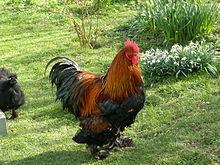
“I have heard that it was rather famous in the hollands and brandy way” intrigued me. Apparently smuggling brandy was big on the English coast in the 18th century to get out of paying duty. Kegs were brought by sailing ships and pushed up the cliffs to men who kept them in their homes. Whole communities thrived on this, all because of huge taxes. Such a colorful past to contemplate!
Since we’ve just finished reading his short story The Lamplighter:, it’s interesting that Dickens noted this was a dangerous place to hold that job. The streets were steep and narrow, and they “usually fell over the cliff at an early age.” ☹️
Were you surprised at the style of this essay, as I was?
 I've been enjoying your posts, Kathleen! It's very cool that there is a connection to "The Lamplighter" in this work.
I've been enjoying your posts, Kathleen! It's very cool that there is a connection to "The Lamplighter" in this work. The Netherlands was famous for its gin, sometimes flavored with juniper, that was called "the hollands." The taxes must have been huge because I remember reading books set on the Cornwall coast that featured smuggling liquor too.
The style of this essay reminds me of Dickens' works we read last summer, Our English and French Watering-Place. Those were set during the summer so I'm interested to see what he writes during the season of autumn.
 Connie wrote: "I've been enjoying your posts, Kathleen! It's very cool that there is a connection to "The Lamplighter" in this work.
Connie wrote: "I've been enjoying your posts, Kathleen! It's very cool that there is a connection to "The Lamplighter" in this work. The Netherlands was famous for its gin, sometimes flavored with juniper, that..."
Thank you, Connie. So interesting about the juniper flavor. I understand gin originated in Netherlands.
I missed that read from last summer, but it sounds like a must for me sometime soon.
One of the things I love about this group is the connections found between the many different Dickens works!
 Lee G wrote: "I just ordered the book & will be joining in this weekend!"
Lee G wrote: "I just ordered the book & will be joining in this weekend!"I look forward to your thoughts, Lee--glad you'll be with us!
 I loved the tie-in with the lamplighters and the bit about the smuggling cast me right back to Daphne du Maurier's Jamaica Inn and Graham's Ross Poldark series. Smuggling was almost a trade in those days, not necessarily only hardened criminals were involved in.
I loved the tie-in with the lamplighters and the bit about the smuggling cast me right back to Daphne du Maurier's Jamaica Inn and Graham's Ross Poldark series. Smuggling was almost a trade in those days, not necessarily only hardened criminals were involved in.Of course, with Dickens you always feel you are right there, gazing out the window with him.
I also enjoyed the article on Vickie's chickens. I have owned them in the past (although never to the tune of $5000, thank goodness), and they are remarkably intelligent creatures with distinct personalities.
 Sara wrote: "I loved the tie-in with the lamplighters and the bit about the smuggling cast me right back to Daphne du Maurier's Jamaica Inn and Graham's Ross Poldark series. Smug..."
Sara wrote: "I loved the tie-in with the lamplighters and the bit about the smuggling cast me right back to Daphne du Maurier's Jamaica Inn and Graham's Ross Poldark series. Smug..."I have never had chickens myself, but heard they were smart. And I still have to read those two, and when I do, I'll be watching for the smuggling parts!
 Out of Town Part Two
Out of Town Part TwoDickens continues to create stories, imagining himself a smuggler, even defending his tub as if he was in the battle of Thermopylæ.
He describes how the new “tidal trains,” that made connections with the steam ships, and the steam ships that ferry in visitors meant “new Pavilionstone is rising up.”
I believe Jean has told us previously about the tidal train Dickens took in 1865 (which would be ten years after writing this), from Folkestone to London, that ended in a horrific wreck. Dickens miraculously survived and did what he could to help the other passengers. Knowing this makes me see a streak of innocence in this essay.
What do you think “We are a little mortary and limey at present” means?
He touches on the Great Pavilionstone Hotel--possibly the Grand Hotel?

“If you are for public life at our great Pavilionstone Hotel, you walk into that establishment as if it were your club; and find ready for you, your news-room, dining-room, smoking-room, billiard-room, music-room, public breakfast, public dinner twice a-day (one plain, one gorgeous), hot baths and cold baths.”
This seems the height of luxury to me, to be pampered at such a place!
 I need to be offline for a few days, but will be back Sunday with some notes from the third part of this essay.
I need to be offline for a few days, but will be back Sunday with some notes from the third part of this essay. Hope you’re enjoying armchair traveling, Dickens style!
 Kathleen wrote: "What do you think “We are a little mortary and limey at present” means?"
Kathleen wrote: "What do you think “We are a little mortary and limey at present” means?"I thought he was saying there is construction underway, the place is growing. Mortar and lime were both ingredients used in construction work, sealing between bricks, etc.
I also love the look of the hotel...what luxury!
Happy travels yourself, Kathleen.
 Dickens seems to be contrasting the old with the modern with the advent of trains. Trains brought in construction supplies, as well as people to vacation in the seaside towns and buy goods at the new shops that are being constructed. He's finding it so much easier to travel to his favorite spots along the seacoast.
Dickens seems to be contrasting the old with the modern with the advent of trains. Trains brought in construction supplies, as well as people to vacation in the seaside towns and buy goods at the new shops that are being constructed. He's finding it so much easier to travel to his favorite spots along the seacoast.The hotel seems to be a delightful place to vacation!
 Sara wrote: "Kathleen wrote: "What do you think “We are a little mortary and limey at present” means?"
Sara wrote: "Kathleen wrote: "What do you think “We are a little mortary and limey at present” means?"I thought he was saying there is construction underway, the place is growing. Mortar and lime were both in..."
Thank you Sara, and for explaining the lime! I didn't make the connection, but that makes perfect sense.
 Connie wrote: "Dickens seems to be contrasting the old with the modern with the advent of trains. Trains brought in construction supplies, as well as people to vacation in the seaside towns and buy goods at the n..."
Connie wrote: "Dickens seems to be contrasting the old with the modern with the advent of trains. Trains brought in construction supplies, as well as people to vacation in the seaside towns and buy goods at the n..."Great points, Connie. And I love how he turns that into a story too, where in the past people on their way to France were dropped off in the middle of the night and forced, along with other travelers ("crumpled company") to sleep in something more like a barn than this luxurious hotel!
 We're now to our third part of Out of Town, through “when he is brought out of his den to stand on his head in the presence of the whole Collection.”
We're now to our third part of Out of Town, through “when he is brought out of his den to stand on his head in the presence of the whole Collection.”I particularly enjoyed Dickens’ depiction of the details on view, from varying facial features to the violent snaps of leather bags.
Working Men’s Institution - Wikepedia (https://en.wikipedia.org/wiki/Working...) tells me these recreational clubs were started around the time this essay was written. From Dickens' statement: “May it hold many gipsy holidays in summer fields, with the kettle boiling, the band of music playing, and the people dancing; and may I be on the hill-side, looking on with pleasure at a wholesome sight too rare in England!”, it sounds like, though he was himself a workaholic, he is in favor of more relaxation. Unsurprisingly, he wishes for more theatres!
He references the second commandment about not worshiping graven images, when speaking of the wax works. I did not realize there was a Moving Wax Works of the Royal Court of England, a “museum or exhibition of 140 life-size figures, some apparently with clockwork moving parts” in London in the early 1700s. Was there such a thing in Folkestone?
Cooke’s Circus apparently came by.
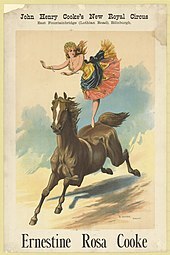
and I love how Dickens questions what is going on in the minds of the animals.
Who else would write a travel piece on Folkestone to include a discussion of the abuse of animals in the circus?
 I am loving this selection which Dickens makes unique by incorporating the heroic imaginations of a child into the travelogue description along with social commentary and some delightful one-liners. My favorite of the latter, capturing succintly the atmosphere of ocean resort off season, was, "I beheld a Punch’s Show leaning against a wall near Park Lane, as if it had fainted." Despite the time passed, the essay has much that is as observable or as relevant today. Although seen not as often, I do recommend one visits somewhere where the boats are allowed to ground as tide recedes. It is quite a sight but less common now because of the damage that can be incurred.
I am loving this selection which Dickens makes unique by incorporating the heroic imaginations of a child into the travelogue description along with social commentary and some delightful one-liners. My favorite of the latter, capturing succintly the atmosphere of ocean resort off season, was, "I beheld a Punch’s Show leaning against a wall near Park Lane, as if it had fainted." Despite the time passed, the essay has much that is as observable or as relevant today. Although seen not as often, I do recommend one visits somewhere where the boats are allowed to ground as tide recedes. It is quite a sight but less common now because of the damage that can be incurred.
 I formed a strong mental image of Dickens people-watching...a favorite sport of my own when I go to the beaches.
I formed a strong mental image of Dickens people-watching...a favorite sport of my own when I go to the beaches. What a wonderful find in the circus flyer, Kathleen. I'm sure the living state of the animals then would appall us today. I remember the sorry conditions for zoos back in the late 1950s and early 60s. Of course, a man of feeling, like Dickens, would notice and wonder about the animals' pov.
 Sam wrote: "I am loving this selection which Dickens makes unique by incorporating the heroic imaginations of a child into the travelogue description along with social commentary and some delightful one-liners..."
Sam wrote: "I am loving this selection which Dickens makes unique by incorporating the heroic imaginations of a child into the travelogue description along with social commentary and some delightful one-liners..."I can imagine seeing the boats at low tide is fascinating, Sam. But then there is a magic to all the coastal work and lifestyles to me.
So glad you're enjoying this. I know what you mean about the one-liners. I love the one you mentioned, and also "fat leathern bags for five-franc pieces, closing with violent snaps, like discharges of fire-arms, by thousands."
 Sara wrote: "I formed a strong mental image of Dickens people-watching...a favorite sport of my own when I go to the beaches.
Sara wrote: "I formed a strong mental image of Dickens people-watching...a favorite sport of my own when I go to the beaches. What a wonderful find in the circus flyer, Kathleen. I'm sure the living state of ..."
I remember that too, Sara, and the first time I went to the circus--I think I was a young teen. I was appalled! Dickens seems so far ahead of his time on these things.
And there's more Dickens people-watching in the next essay, so stay tuned. :-)
 Dickens gives a fascinating description of harbor life in this last part, including the mud, the fishing boats grounding as Sam mentioned earlier, and the steamer smoke.
Dickens gives a fascinating description of harbor life in this last part, including the mud, the fishing boats grounding as Sam mentioned earlier, and the steamer smoke.This website gives some fascinating history: https://www.folkestoneseafront.com/fo....
and provides a great image of the harbor not long before Dickens was there:
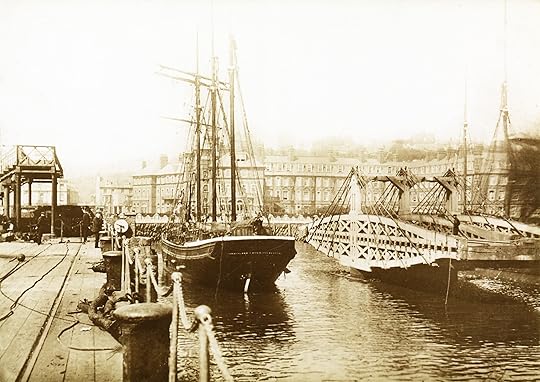
They indicate the population tripled in size between 1851 and 1881!
Any idea what he means here? “And here I may observe of the very little wooden lighthouse, that when it is lighted at night,—red and green,—it looks so like a medical man’s, that several distracted husbands have at various times been found, on occasions of premature domestic anxiety, going round and round it, trying to find the Nightbell.” Did doctors use these kind of lights on their establishments?
Charles Dickens gives personality even to the boats, making them “get into good spirits and dance” with the incoming tide.
I imagine the bustle and travel transformations and constant change was inspiring to Dickens’ active mind. You can almost hear it whirring in this piece!
 "Now, there is not only a tide of water, but a tide of people, and a tide of luggage -- all tumbling and flowing and bouncing about together."
"Now, there is not only a tide of water, but a tide of people, and a tide of luggage -- all tumbling and flowing and bouncing about together."I like how Dickens uses the metaphor of the tide to describe the flow of the tidal train, the people, and the luggage. They are all timed according to the tide coming in so the passengers on the train can connect with the steamship.
 Regarding Kathleen's question about the red and green lights:
Regarding Kathleen's question about the red and green lights:Arthur Conan Doyle, who was also a doctor, wrote a book of medical short stories, "Around the Red Lamp." This website says that doctors had a red lamp outside their offices. (Of course, the red light is associated more with prostitutes.)
https://www.arthur-conan-doyle.com/in...
 Connie wrote: ""Now, there is not only a tide of water, but a tide of people, and a tide of luggage -- all tumbling and flowing and bouncing about together."
Connie wrote: ""Now, there is not only a tide of water, but a tide of people, and a tide of luggage -- all tumbling and flowing and bouncing about together."I like how Dickens uses the metaphor of the tide to d..."
He makes you almost feel the swell, doesn't he!
 Connie wrote: "Regarding Kathleen's question about the red and green lights:
Connie wrote: "Regarding Kathleen's question about the red and green lights:Arthur Conan Doyle, who was also a doctor, wrote a book of medical short stories, "Around the Red Lamp." This website says that doctor..."
Aha! Thank you so much for finding that, Connie. Prostitutes was certainly my association. (Funny story: when I was in high school, my sweet and innocent mother put a red light on our porch one Christmas to be festive, leading to no amount of teasing from my friends!)
This is one of those bits of information that will surely appear in further reading, and now I'll understand. :-)
 Kathleen wrote: "Funny story: when I was in high school, my sweet and innocent mother put a red light on our porch one Christmas to be festive, leading to no amount of teasing from my friends!"
Kathleen wrote: "Funny story: when I was in high school, my sweet and innocent mother put a red light on our porch one Christmas to be festive, leading to no amount of teasing from my friends!"That sounds like the type of thing my mother would do, Kathleen, although my father would have known better after being a soldier in WWII.
 Love the image of the boats, Kathleen. There is something so serene about the boats returning to harbor. When I was younger, I had a favorite place we went to in Florida where there was a swing on a hillside overlooking the water and you could sit at sunset and watch the shrimp boats returning. It was one of the calmest things I have ever done.
Love the image of the boats, Kathleen. There is something so serene about the boats returning to harbor. When I was younger, I had a favorite place we went to in Florida where there was a swing on a hillside overlooking the water and you could sit at sunset and watch the shrimp boats returning. It was one of the calmest things I have ever done. Your mother sounds like my mother, Kathleen.
And thanks so much, Connie, for the info on the red light!
 Kathleen wrote: "We're now to our third part of Out of Town. . .
Kathleen wrote: "We're now to our third part of Out of Town. . . I did not realize there was a Moving Wax Works of the Royal Court of England, a “museum or exhibition of 140 life-size figures, some apparently with clockwork moving parts” in London in the early 1700s."
Kathleen is referring to these lines:
"We take more kindly to wax-work, especially if it moves; in which case it keeps much clearer of the second commandment than when it is still."
I remember the traveling wax works show in The Old Curiosity Shop! For a time Nell and her grandfather traveled with old Mrs. Jarley.
If I know'd a donkey wot wouldn't go
To see Mrs. JARLEY'S wax-work show
Do you think I'd acknowledge him? Oh no no!"
And NOW I wonder, did some Victorians disapprove of wax-works, just as Dickens riffs about staying clear of the Second Commandment?
 https://victorianweb.org/mt/waxworks....
https://victorianweb.org/mt/waxworks...."Victorian Waxworks and Charles Dickens"
My first link. Does it work?
 Oh, I love this, Lee. Thanks so much for finding it! I do remember Mrs. Jarley, and poor Nell does not look very happy. I did not remember that wax works were also mentioned in David Copperfield and Great Expectations though, as your website link says.
Oh, I love this, Lee. Thanks so much for finding it! I do remember Mrs. Jarley, and poor Nell does not look very happy. I did not remember that wax works were also mentioned in David Copperfield and Great Expectations though, as your website link says.Aren't they creepy? I think you're right that not everyone approved.
What really surprised me was the "moving" part. My mind goes to the Abraham Lincoln exhibit at Disneyland (kind of long video about it: https://www.youtube.com/watch?v=mDCoH...) that I remember from my childhood, but Abe was not wax, he was a mechanical creation.
I can imagine this was quite a show back then!
 Sara, your Florida perch sounds wonderful. Thanks to you and Sam, I going on a quest to find a place to watch these boats. It sounds so calming. Wish I could just go to Folkestone!
Sara, your Florida perch sounds wonderful. Thanks to you and Sam, I going on a quest to find a place to watch these boats. It sounds so calming. Wish I could just go to Folkestone!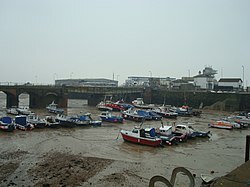
 Today we begin discussing Out of the Season.
Today we begin discussing Out of the Season.“I began business by looking for two hours at the sea.” I can’t tell you how much I love this idea. 😊
The Crimean War was going on at this time. Is that the foreign militia he refers to?
After the important matter of looking at the sea is out of the way, he intends to sit down and write “a chapter of unheard-of excellence.” (The striking thing to me is that he probably did just that!)
He’s distracted by the pier clock, and then he fell “into a grave solicitude about half-seconds.” Such a mind. I wonder what he was thinking? How to fit more into each minute?
Another distraction--the Custom-house cutter. I believe a cutter is a boat that patrols for the custom house, where duty is collected.
Here's one (courtesy of https://www.shippingwondersoftheworld...) chasing a smuggler:

Naturally, he must take a closer look.
“It was impossible, under the circumstances, for any mental resolution, merely human, to dismiss the Custom-house cutter, because the shadow of her topmast fell upon my paper, and the vane played on the masterly blank chapter.”
Then a Packet (used I believe to haul freight and mail) captures his attention, along with the passengers and crew, including a woman clutching a bowl that indicates they must have crossed some rough waters. The mail is dropped off and, in that particularly way he has of bringing all objects to life, he thinks “O that I myself had the sea-legs of a mail-bag!”
He references Old Moore’s Almanac, another item we learned about in our discussion of The Lamplighter:! And also, the sage Raphael
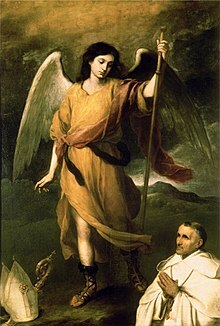
who is said to guard pilgrims on their journeys.
I took his meaning to be that by watching carefully all that was going on, he learned more than any expert or divine intervention could tell him.
What do you think?
 Dickens was suffering from writers' block, and who could blame him when he had such a beautiful location to distract him? He may not be writing what he originally set out to write, but he was doing research for this delightful essay without really planning it.
Dickens was suffering from writers' block, and who could blame him when he had such a beautiful location to distract him? He may not be writing what he originally set out to write, but he was doing research for this delightful essay without really planning it.Kathleen, I agree with your interpretation of his meaning that the experts could not tell him more than his educated observations. Old Moore's Almanac was used for the tide charts. It was a beautiful day so the Archangel Raphael may have not been needed, but many travelers probably prayed for his protection if it was stormy!
Books mentioned in this topic
Reprinted Pieces (other topics)Out of the Season and Out of Town (other topics)
The Norwood Gipsy's Fortune Teller Guide -- Antiquated Esoteric Edition (other topics)
Out of the Season and Out of Town (other topics)
Treasure Island (other topics)
More...
Authors mentioned in this topic
Charles Dickens (other topics)Charles Dickens (other topics)
Thomas Hardy (other topics)
W.S. Fortey (other topics)
John Milton (other topics)
More...







This read will be hosted by Kathleen.
Please allow Kathleen to comment first! Thank you.